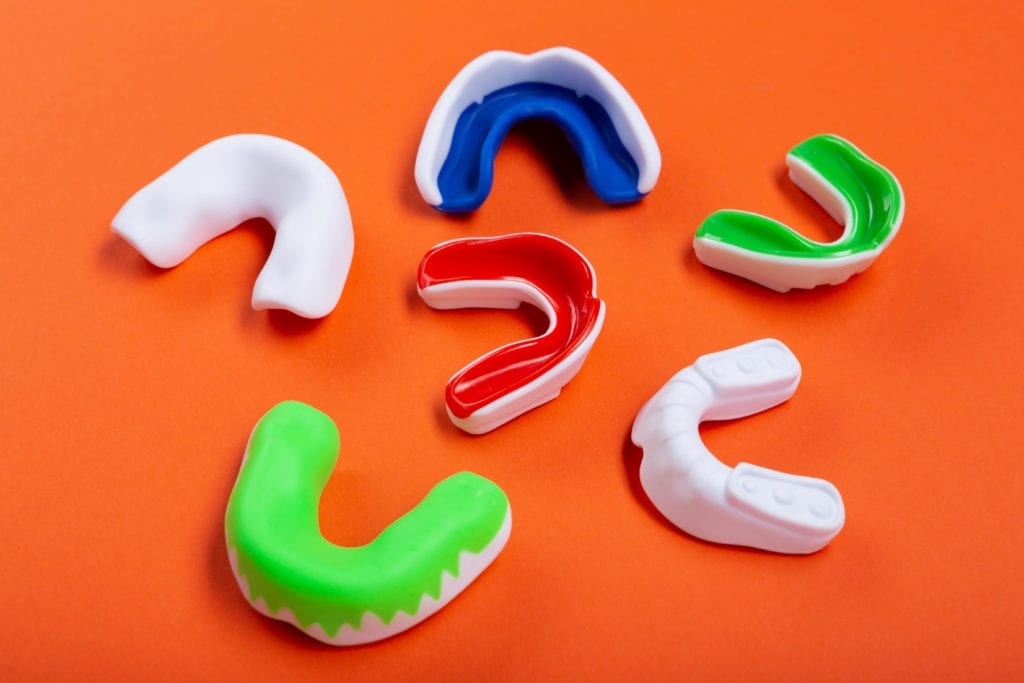Mouthguards should be worn for contact sports, like basketball, soccer, and lacrosse, where a ball or other players may hit players. It is estimated that more than 5 million teeth are knocked out due to sports every year. However, the American Dental Association states that sports mouthguards can prevent over 200,000 tooth injuries.
Professional custom-fit sports mouth guards can prevent people from resorting to solutions such as dental crowns or tooth bonding for cracked and chipped teeth. They may also prevent missing teeth and the need for restorative treatments. Dr. Jessica Christy and her team at Orchard Hill Dental offer custom-fit sports mouthguards to patients in Hendersonville, NC.
In addition to general dental services, Dr. Christy provides custom mouthguards to new and existing patients. Learn about the benefits of mouthguards and the treatment process provided by your dentist in Hendersonville, NC, below.

Sports Mouthguards in Hendersonville
Dr. Christy offers custom sports mouthguards in Hendersonville, North Carolina. This dental solution protects teeth from hits and injuries to the mouth. Mouthguards:
- Prevent tooth loss
- Fit securely
- Reduce the chance of concussion
- Protect dental work from damage
- Provide a stable result
Custom mouthguards have many benefits compared to over-the-counter solutions. Drugstore mouthguards have to appeal to a wide variety of different people. It’s rare that they ever fit anyone perfectly. Boil and bite mouthguards insist they provide a custom fit, but it only goes so far. With most drugstore mouthguards, the only way to keep it in your mouth is to clench your teeth whenever you wear it.
When you’re focused on keeping your mouthguard in, you can’t give your sport your full attention. You can’t communicate with your team or take a quick water break without taking your mouthguard out. If you’re doing that multiple times during the game, it’s easy to make a slipup or for you to drop your mouthguard. The guard shouldn’t be the main focus you have.
In addition, clenching your teeth all of the time aggravates the jaw joint and the muscles that move it. The longer this goes on, the more your jaw joint breaks down. It causes issues like pain throughout your head and face, popping and clicking when you move your jaw, and an inability to move your job in certain positions.
Custom mouthguards are made for you specifically. They fit snugly enough in your mouth so you don’t have to worry about clenching your teeth. You can communicate freely and get a drink of water with ease.
Sports Mouthguards: What to Expect
Dr. Christy works with you to create a custom sports mouthguard. She will take a dental impression or mold of the teeth so that the final product can be crafted. Then, she will ensure the mouthguard is comfortable and easy to use.
Your mouthguard should fit securely to your teeth without the need to bite or clench the mouthguard. If your mouth guard does not fit properly, it can fall out, so it is important to ensure it fits correctly.
Although they can last three to five years, mouthguards should be replaced yearly to ensure they fit properly each sports season. A general breakdown from repeated use may alter the fit of the mouthguard.
Sports Mouthguards Vs. Nightguards
If you have a guard for either sports or teeth grinding protection, you may be tempted to use it for another purpose. However, it’s important that you only use your guard for its specific purpose. These guards are very different and will only adequately protect your teeth when used for their intended purpose.
Sports mouthguards are bulkier and made of a lightweight material. They’re bulky because they absorb the shock from hits and trauma. If you tried to use this at night, you would grind your teeth through the material, harming both the guard and your smile.
Nightguards are thinner and made of a harder material. They protect the surfaces of your teeth and prevent them from grinding against each other, wearing them down. Wearing one of these during sports wouldn’t protect your mouth from shock. You wouldn’t have much more protection than you would not wearing a guard.
Caring for Your Custom Mouthguard
If you want your guard to protect your teeth, you must care for it properly. Rinse the guard with cool water each time you take the guard out. It removes saliva and debris that have built up in it during use. After a game or practice, clean the guard with mild soap or non-abrasive toothpaste and a soft-bristled toothbrush. It prevents bacteria from accumulating in the mouthguard, causing an unpleasant odor and potentially harming your health.
About once a week, sanitize the mouthguard, too. There are specific mouthguard cleanser tablets you can dissolve in water to soak your mouthguard. A solution of water and vinegar or hydrogen peroxide will also work. This sterilizes the guard and prevents harmful bacteria buildup and infection.
Store it in a ventilated carrying case when you’re not wearing it. Bacteria love a warm, wet environment and multiply quickly in an area without ventilation. It also keeps your guard safe from damage. Ensure you clean your case regularly, as a clean mouthguard shouldn’t go in an unclean case. Even when it’s in the case, avoid placing it in areas of direct sunlight or heat, as this can warp the material. Never use hot water to clean it, either.
Inspect your guard regularly for any signs of wear or damage. You know your mouthguard best, and you’ll notice if something isn’t right. If the fit of it changes, you notice the color change in certain areas, or you see signs of wear. Avoid using the guard if you see anything severe, like cracks or tears. You’ll need to get a new one to protect your teeth.
Custom Mouthguard FAQs
Custom mouthguards are the preferred choice to protect your teeth. Learn more by reading the answers to these commonly asked questions.
How often should I replace my mouthguard?
You should replace your mouthguard every 6 to 12 months. It will depend on wear and tear. You should replace stock mouthguards should least once every few weeks. Boil-and-bite mouthguards can last for several months with proper care. Inspect your mouthguard regularly for signs of wear and tear, and replace it if it becomes damaged or no longer fits properly.
How do I choose the right mouthguard?
Choosing the right mouthguard will depend on your needs and preferences. It’s best to consult a dentist for advice about which mouthguard is most suitable for you. Generally, three types of mouthguards are available: stock or pre-formed, boil-and-bite, and custom-fit. Stock mouthguards come in one size and are usually the least expensive, but they are not as comfortable as others.
You can purchase boil-and-bite mouthguards at a sporting goods store. You can adjust to fit your teeth by boiling and biting into them. Dentists design custom-fit mouthguards for an individual’s bite, and they provide the best protection against injuries. Custom-fit mouthguards are the best option overall.
Can I wear a mouthguard if I have dentures?
Yes, it is possible to wear a mouthguard if you have dentures. You can wear a mouthguard over your dentures. The best type of mouthguard will depend on your situation. Boil-and-bite and custom-fit mouthguards are generally better options than stock mouthguards. Additionally, consult with your dentist to determine the best type of mouthguard and any modifications that may be necessary.
Do mouthguards cause gum recession?
If your mouthguard does not fit properly or is too tight, it can irritate your gums, which may lead to gum recession. Furthermore, if you do not clean your mouthguard, it can harbor bacteria that can cause gum disease and also contribute to gum recession. It is essential to ensure that your mouthguard fits correctly before using it.
Can you still lose teeth with a mouth guard?
While a mouthguard can protect from direct trauma, it does not prevent all dental injuries. In some cases of severe impact or trauma, you can still lose a tooth even when wearing a mouthguard. However, wearing a mouthguard reduces the risk of tooth loss significantly compared to not wearing one at all. It’s important to wear a properly fitted mouthguard and follow the usage instructions to ensure maximum protection.
Can I wear a mouthguard with braces?
Yes, you can wear a mouthguard with braces. Wearing a mouthguard while undergoing orthodontic treatment is essential to protect your teeth and braces from impact. There are mouthguards available for individuals with braces.
There are custom-fit mouthguards that a dentist or orthodontist provides. Dentists design these mouthguards to fit your teeth and braces and provide protection while accommodating your braces. It’s essential to discuss your options with your orthodontist and choose a mouthguard that’s suitable for your needs.
